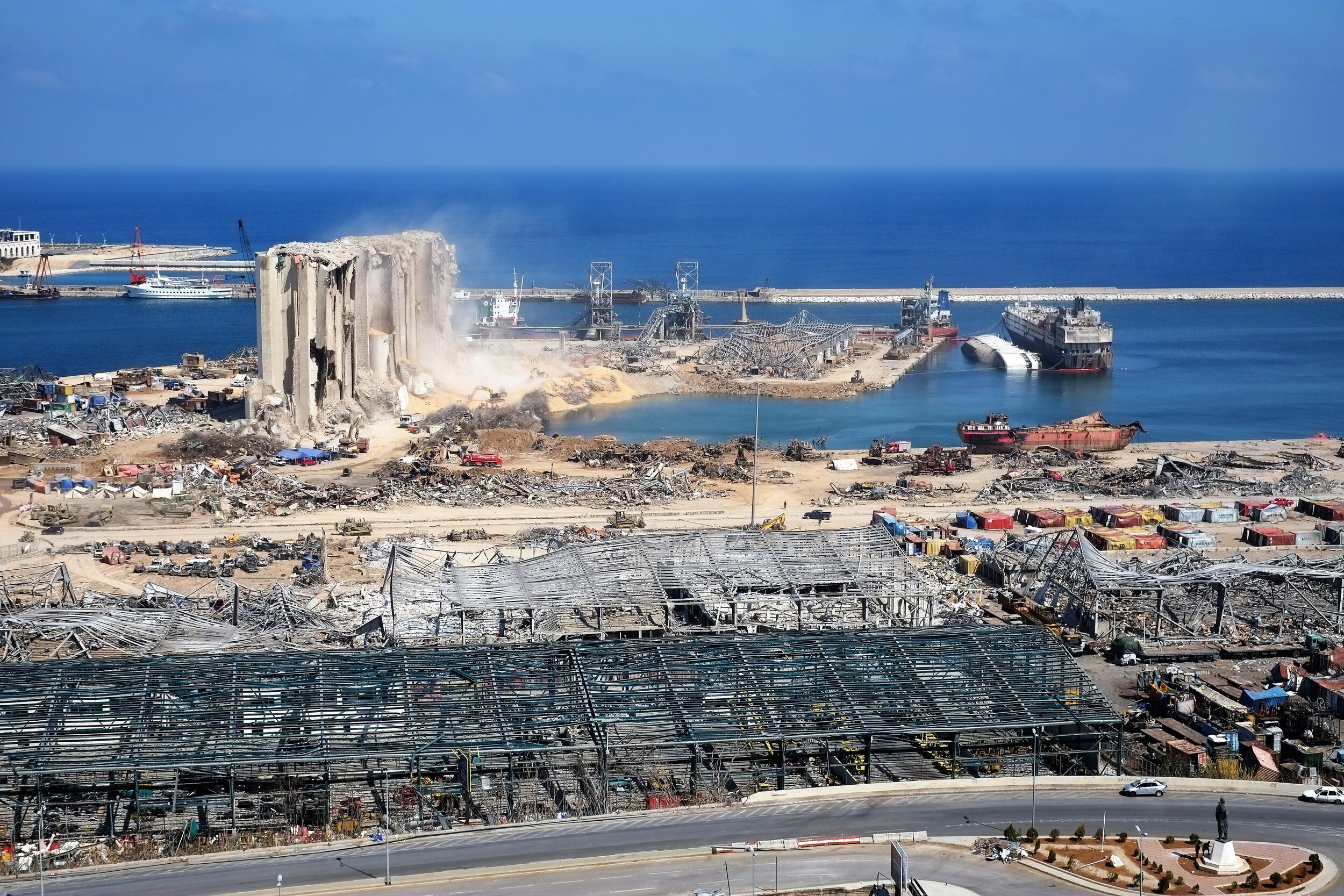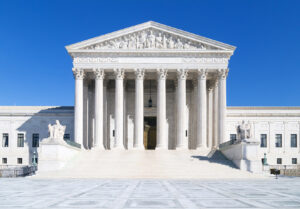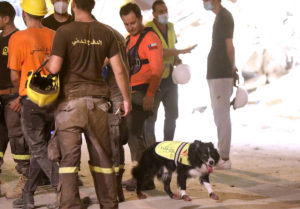
The Beirut explosion finally put an end to the country’s masquerade.
Overcome by the staggering violence of the explosion that ravaged Beirut in August, Paris-based playwright and director Wajdi Mouawad suggests that a world public forum must condemn Lebanon’s ruling class, which “operates only in its own interests and the interests of those who placed its leaders at the head of the country.”
Wajdi Mouawad
A monstrosity is a tragedy for which no words have been found to tell its story. Words will not be soon found to describe what has just devastated the Lebanese. This deflagration will remain the monstrosity of this country. And hangar number 12 of August 4, 2020 is the echo of the bus of April 13, 1975 [the attack in the suburbs of Beirut on a bus of Palestinian militants by Christian Phalangists, leaving 27 dead, in retaliation for the murder of one or—according to the versions—several Christians a few hours earlier, is considered to be the beginning of the Lebanese civil war, that would last until 1990].
Between these two dates is the courage of a people facing a thousand trials, a thousand bankruptcies, a thousand miseries, a thousand disappearances, four hundred thousand deaths and millions of exiles, which today confronts a force composed of many of yesterday’s assassins and thieves. We can say that, just as it began, the civil war has just ended: monstrously. It ended in a second of staggering violence, an explosion so deafening that what exploded on Tuesday, August 4, was not only a stockpile of 2,750 tons of ammonium nitrate, but also all the anger contained in the hearts of 15 million Lebanese, (4 in the country, 11 outside) an anger so repressed, so condensed, so pressurized, that nothing could contain it any longer. No more fear, no more worries, no more anxieties, nothing was big enough, no fear, neither of the future nor of the present, so much so that the future faded and the present became a burden. And as for the past, it is nothing but pain and shame, shame and shame again.
The indignation expressed by the ruling class is an insult, a scandal.
That is why the indignation expressed by the ruling class is an insult, a scandal. And to this strange President of the Republic, wondering how 2,750 tons of ammonium nitrate could have been left unclaimed for such a long period of time and in such a sensitive location, one would be tempted to ask whether the presence of four decades of anger left unclaimed and in such a sensitive location as the hearts of the Lebanese does not raise his astonishment and indignation just as much.
To this ruling class, which operates only in its own interests and the interests of those who placed it at the head of the country, we would like to ask whether the violence of this detonation, heard as far away as Cyprus, is finally strong enough to reach its conscience? Can these politicians make the connection? Do they get the link between this explosion and the youth of this country, who have flooded the streets for months to demand freedom and justice, to make their desire to live and their lack of hope heard, these youth who have been threatened, despised, and to whom the forces of law and order have ended up being sent?
Corruption
Can they manage to make the link between this unspeakable explosion and their corruption? What of a link between this explosion and the lack of electricity, the collapse of the school system, the country’s inability even to properly organize garbage collection? Do they make the link between this terrifying howl that devastated three-quarters of the city, throwing 250,000 people out of their homes, and the collapse of the economic and banking system—a collapse for which they are primarily responsible and the great profiteers? Do they see? Do they hear what they have just shouted? Which of these cunning [rulers], these pawns, these puppets, these incompetents, will have the courage to stand up and say, “We are primarily to blame”? Which one will know how to say something other than: “No, it is not our fault! The proof: we also have tears in our eyes and we cry with you!”? Who will dare to doubt himself, just for a moment and a moment only?
What else will they be able to say that they haven’t said? What lies have they not yet used? For the longest time, they’ve not stopped humiliating the Lebanese and they’ve never heard anything—they hear nothing, see nothing, recognize nothing, [yet] they pretend to be serious while transforming the country into a strip poker game, stripping others, raping everything that can be raped, passing down leadership from father to son, the nightmares of this country. Is the breath of this explosion, two days before the anniversary of the one that razed Hiroshima, powerful enough to make them hear this point of no return that their fellow citizens have just crossed?
Everything is destroyed, even the future.
Because this is a point of no return. It is over. Everything is destroyed. Even time. Not just concrete. The future. There is nothing. And this nothing, strangely enough, at the bottom of the abyss into which the country has fallen, arrives with astounding clarity.
What do we do now?
That is why, in spite of the destruction, in spite of the unbearable grief of the dead and the missing who are added to those already dead or missing, what has just happened is on the side of the Lebanese people. This explosion is on their side, it is their last force thrown in the battle against those who crush them; it is, despite the misfortune it brings with it, their exterminating angel. It puts an end to all masquerades. What could be even more appalling? What can happen even more appallingly for justice, the shadow of justice, to regain its dignity in this country and succeed in ridding it of that which slashes its hopes every day?
We must therefore see in this horror that has just arrived a lever to stop the horror. To overturn a nightmare, it is said, one needs a nightmare of equal power, as infinity is cancelled out by minus infinity. If the civil war was this monstrosity, the explosion that has just taken place is the monstrosity that cancels it out, thus bringing Beirut back to zero. Everything is at zero. Everything is in ruins. What will happen now?
Now, as after every violence that this country has witnessed, we will have to relearn to swallow our saliva. It’s sometimes a very courageous gesture, swallowing one’s saliva. Now, therefore, history must be reconstructed. History is in tatters. Gently console each piece, gently heal each memory, gently rock each image. But for this reconstruction, this gentleness, this benevolence to happen in the land of the cedars, Lebanon needs help that is not only financial, but above all made of justice. Lebanon thirsts for justice. And the first justice to be done is that what has just taken place should be subject to a transparent investigation, conducted by an independent and international commission, with inspectors appointed by the United Nations, so that the Lebanese, who have lost all confidence in those who have deprived them of their lives by holding on to power for so many years, feel that they are being told the truth. The dead deserve this and those who mourn the dead deserve even more.
Lebanon needs all international aid to be entrusted to institutions and organizations that will be able to prove that nothing has been paid out in secret commissions, further fuelling the corruption of the leaders and the injustice of the country.
Stop making Lebanon their instrument
What this country needs most of all is the encouragement of its revolutions. Because they will not stop. In the first place the youth will hear its thirst and its anger again and it needs support so that those who crush this country are all, that is to say, all removed from their places at the head of the country. And if it is true that the powers in Iran, Israel, Turkey, Russia, the United States and Saudi Arabia have made known their immense feelings and solidarity with the Lebanese people, they will have to, in order to be in alignment with their tears and their words, stop, as of today, making Lebanon their instrument, that of the Iranians against the Israelis, of the Israelis against the Syrians, of the Turks against the Europeans, of the Americans against the Russians, and of the Saudis against the Iranians. Much more than money, this is what Lebanon needs. But against this violence, one fears that the explosion that has just taken place is still too weak. Against the nameless brutality of such states, it would take the wrath of a thousand suns, and since Sophocles we know that the gods are insensitive to injustice, he who put in Electra’s voice the injunction that resounds so loudly today: “But where are the wraths of Zeus, where is the blazing sun, if, at the sight of such crimes, they remain without acting in the shadows?”
Sophocles knew how to find the words of the monstrosities of his time and he turned them into tragedies. Will anyone know how to find the words of the monstrosities of our time? The shaking is so powerful that one stutters, the censorship so brutal that one trembles, the indifference so hideous that one liquefies. And yet we must continue. At least try, with nothing, to pave the way for those who will come after us to succeed in doing what we are unable to do. But if they manage to bring joy to this country and give it back its strength of life and freedom, it will be because we have not completely given up. [from Le Monde]
Trans. from the French by Jordan Elgrably












![Ali Cherri’s show at Marseille’s [mac] Is Watching You](https://themarkaz.org/wp-content/uploads/2025/09/Ali-Cherri-22Les-Veilleurs22-at-the-mac-Musee-dart-contemporain-de-Marseille-photo-Gregoire-Edouard-Ville-de-Marseille-300x200.jpg)



























































































